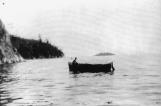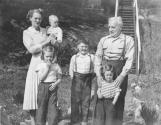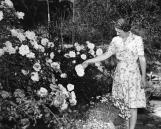19
Sometimes, being the child of a lighthouse keeper was a lot of work.Larry Grafton remembers collecting wood for the foghorn and the house:
Primarily all the wood came off the beach. When we were kids, we had to pack ten loads of wood off the beach on Saturdays. We had a boiler, washday on Monday. There were six tubs in the back shed. We had to fill the tubs with water, of course. One tub had a steam pipe right into it, for boiling clothes. Monday morning was quite a do!
20
Lightkeepers were required to keep the lighthouse in good condition.1930
Point Atkinson, West Vancouver, British Columbia, Canada

21
Norm Dawe remembers:You would paint the house one year and the tower the next. We weren't that modern. That was even before the paint roller was invented-all brushed. From the top rail, you would rig a stage and clock and tackle on each side. You would haul it up to the top, and then climb on over the rail and get down onto the staging and lower your way down. Coffee time was when you got to the bottom-that took a while. Two of us would work, and in three days, we would have half a building done, as well as ourselves.
22
I Married the Keeper!Light keepers' wives shared the life their husbands had chosen. Some took to the lighthouse lifestyle quickly, while others found it isolated and difficult. Lighthouses are often in isolated locations, which discouraged and disheartened some keeper's wives. Ann Woodward's distaste for lighthouse life led to the Woodwards' early resignation of their post.
23
Lighthouse boat used by keepers. Built in 1886.1886
Point Atkinson, West Vancouver, British Columbia, Canada

24
Norm Dawe remembers getting supplies:At Atkinson, we rowed to Caulfield and there was a little Red & White store there. A.B. Cox, proprietor, he was quite a character. Then, of course, his prices were pretty high. Once in awhile, maybe once a month, dad would go … would go into Woodward's and get what they could carry. There was no such thing has having a car in those days… You would row to Caulfeild and from Caulfeild, you would walk up to the highway, Marine Drive, and you catch a Pacific Stage Bus into Vancouver. Before [the bridge] you would go … as far as Ambleside and then you would take the ferry…. In '39, when the bridge went over, then you would go by bus right into town. You would bring what you could in a shopping bag… Mostly canned food. There was no way, especially in the summer, no way of keeping anything remotely cool… we would fish to a certain extent.
26
Others were not bothered by the isolation.Jean Odlum remembers that Point Atkinson was not so different from other stations:
Because you are still isolated, nothing ha[d] changed except the location…. [You were still] in a situation where you can't get out… for a month at a time. Up north, our boat supply trips were once a month if the weather allowed. If the weather didn't allow, well, it was later…. We never minded that particularly. My larder was usually full of things that were usable, even if something else was lacking. There was always lots of coffee and tea and butter and that sort of thing…. We had a good garden at Atkinson and a fruit tree or two. We liked to grow our own stuff if we could. Besides, it's more reliable than once a month.
27
Keepers' wives took on many of the duties of an assistant in addition to the housework and mothering they were already responsible for.Larry Grafton remembers his mother helping out:
Oh yes, that was part of her job. She just had to fill in whenever she was needed. I think she did [wind the lights].
Norm Dawe remembers:
Dad was without an assistant a lot of [the] time and he had to sleep, so mother would keep an eye open…
28
Mother Grafton's 66th birthday.14 June 1923
Point Atkinson, West Vancouver, British Columbia, Canada

29
Dawes with Joyce Godard's nieces and nephew.1940
Point Atkinson, West Vancouver, British Columbia, Canada
 Credits:
Credits:Courtesy of Joyce Godard.
30
Sometimes the challenges to family life that lighthouse work imposed and the expectations of keepers' wives became too much.Norm Dawe remembers during World War II:
[One of] the first things they did was put in the Home Guard. There [were] fourteen of the old veterans, Veterans' Home Guard. They come out there, and guard the point (prior to other equipment?) yea, just the soldiers… (bunkhouses) later one.. (Where did the men stay when they came out?) it's really my sore point in my life. I think they were basically responsible for my mother's early death. So they were billeted in the house, so that would be on the unused portion of the duplex and mother was to cater them. A bunch of older guys can be pretty demanding and so forth and so on, bearing in mind where your food has to come from. Oh, there's compensation, you know what the Canadian government is too. We will just have the compensation speak for itself, doesn't it? They were demanding and they just tore her right down to nothing and she died. Forty-two years old. Then they moved. The Navy came in. They had their signalmen there. Originally they moved into the old chicken house.
31
Clara Dawe in the garden at Point Atkinson.1940
Point Atkinson, West Vancouver, British Columbia, Canada
 Credits:
Credits:Courtesy of Joyce Godard.
32
Jean Odlum remembers:We would have workmen come out to stay for a while to do something specific. They would … bring sleeping bags and stay there [Don Graham (interviewer): part of your duties as light keeper's wife was to cook for them and everything?] That used to gripe me so much. I had a yelling match with the [Marine] office once. They phoned. There would be a crew of two and this was Christmas Eve. No way! And I ranted and raved, and I usually don't do that sort of thing, and Gordon came to the phone. 'Get off the phone,' and he took the phone away from me, and said, 'I will talk to you tomorrow about this," and hung up. And they didn't come, which was very wise of them, if you think about it.
The additional work keepers' wives contributed to the lighthouse system was deeply valuable but many felt they received little recognition outside their families for their efforts.
